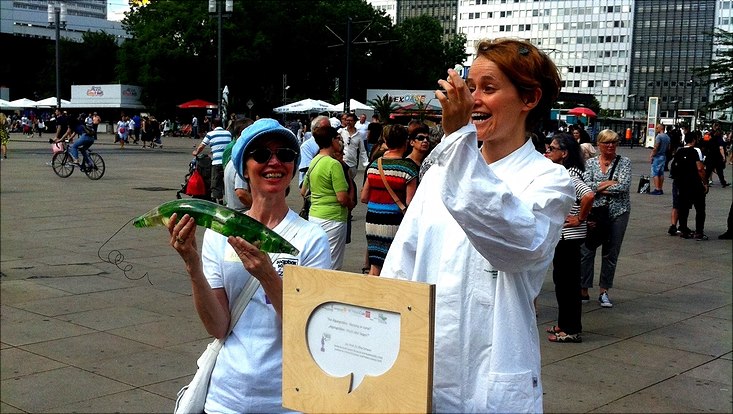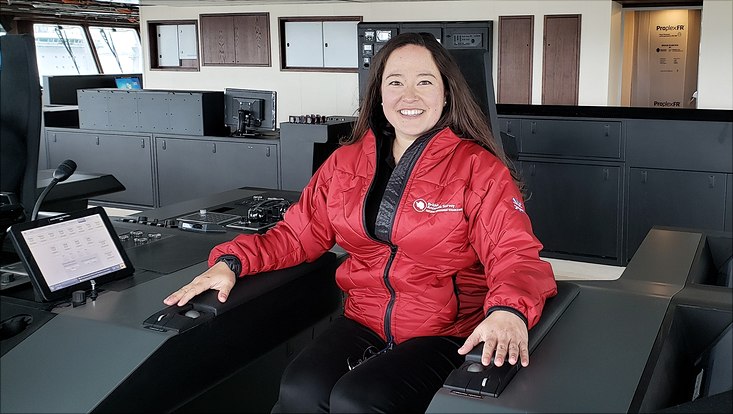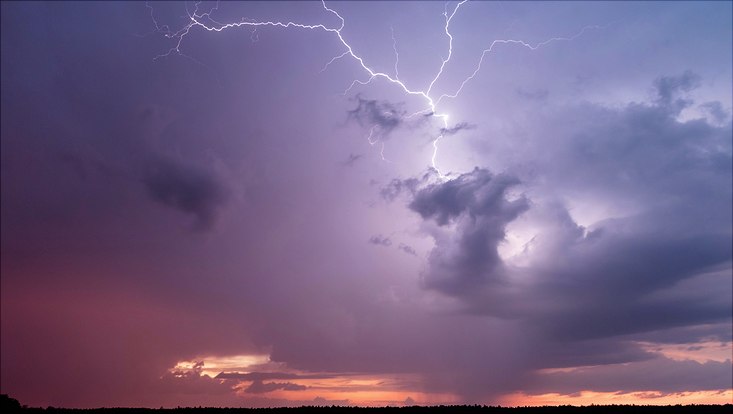Taking science to the people
2 October 2019, by Lisa König

Photo: Soapbox Science
Dr. Elisa Schaum is a Junior Professor at the CEN, where she is currently investigating how marine phytoplankton can adapt to future climate changes. She is also passionate about public outreach. In the name of science, she sometimes takes to the streets, explaining her research to passersby. In the following, she discusses what she likes most about her work – and why it can sometimes be very demanding.
Ms. Schaum, you try to get others excited about science. When did you get hooked on science?
It happened relatively late. I grew up in a family of artists, and I didn’t realize that adults could also do other jobs. As a result, I never even thought about a career in science although I had a romantic predisposition towards stories about explorers. But at some point I decided to simply give it a try. So I started studying – and now I’m a professor.
Do you ever have any doubts about your choice of career?
Sure, about once a week. Sometimes I wish my work were more directly applicable. Art makes people happy, just like music or a good film. But research primarily only makes researchers happy. Though our work might help people in the long run, it feels very far away. On those days I can feel how much work and near-constant rejection is involved. But on other days, I really enjoy it.
Do you think more people should get involved in the natural sciences?
I think we all have a responsibility to care for the Earth and its climate. And to do so, it’s very helpful to understand how our planet works. But some people have bigger problems to deal with. People who, for example, are struggling to keep their family fed may not have the time to think about these issues.
You give talks at schools, write articles for your institute’s newsletter, and give lessons from a soapbox on Alexanderplatz. Why do you want to introduce the public to science?
There are two reasons. First of all, people should know what the share of their taxes that supports scientific research is used for. But for me personally, it’s even more important to highlight the role of women in science.
What’s been your most memorable experience so far?
That’s hard to say – after all, a gardening project with a group of five-year-olds is completely different from a discussion with adults. Each is fun in its own way. I especially liked the event organized by Soapbox Science this year in Berlin, which focused on women in science. The events are always in public locations; this time it was in the middle of Alexanderplatz, which allowed us to reach people from all walks of life.
How interested are people in scientific topics?
During events, I always get the feeling that people are very interested and really want to learn something – but then again, they come to the events of their own free will. On the other hand you have Donald Trump and fake news. On the Internet you can see that some people no longer trust in science. Friends of mine have actually had to discuss with people whether evolution and climate change are real. In such situations, the main question is whether these people are poorly informed, or just want to make trouble. In the latter case, sometimes the only thing you can do is simply walk away.
Does science communication also have a downside?
It takes quite a bit of time, which you don’t always have to spare. A sensible solution would be, for instance, having to teach a few hours less as compensation. At the same time, not everyone is cut out for this type of work. There are excellent researchers out there who simply have no talent for public outreach. And when someone does not want to engage in science communication, they shouldn’t have to explain themselves.
Is it hard for women working in science to be taken seriously?
Let me give you an example: A little while ago I received a letter from the university, and I had to sign for it. When I opened my front door, the mailman asked me if Professor Schaum was home. The possibility that I might be Professor Schaum never occurred to him. I’m sure he didn’t mean it in a malicious way; but our society continues to view women in a different light than men, and it wasn’t the first time something along the same lines had happened that week. I usually genuinely don’t mind not looking ‘the professor way’; it’s the micro-message of who can or cannot be a professor that I do mind.
In your opinion, should only qualified experts talk about their research areas, or can students also talk about scientific topics on YouTube?
If they want to, and are well informed, then why not? They don’t have to know everything; they just have to know more than the people they’re talking to, and not spread dangerous and superficial sound-bites.


